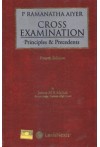- Author(s): P. Ramanatha Aiyer, M R Mallick
- Publisher: LexisNexis
- Edition: 4 Ed Rp 2024
- ISBN 13 9788180386442
- Approx. Pages 1086 + Contents
- Format Hardbound
- Approx. Product Size 24 x 16 cms
- Delivery Time 3-5 working days (within Kerala & South India) (Others 7-9 days)
- Shipping Charge Extra (see Shopping Cart)
......................................................................................................................................
Description
This Edition is coming out after a lapse of nearly five decades from the last Edition. The Art of Advocacy comprises three aspects: (1) knowledge of Legal Ethics, (2) Art of Cross-examination, (3) the manner of presentation of acts and law concerning those facts in such a manner as to convince the presiding officer and be successful in the case. This book deals with "Cross-examination" which itself is an art. Some are born good cross-examiners. Some others become good by study and by observation of others doing the same. One must have a profound knowledge of human psychology to understand the human nature. It requires study of History and Literature, so as to tackle a particular witness during his prosecution in view of the nature of the witness.
One should know the relevant statutory provisions concerning the cross-examination of witnesses, questions which cannot be asked, and questions about
connected matters. So also one must have knowledge of the latest rulings rendered by the Apex Court and the various High Courts. Besides, the cross-
examiner must deal with a particular witness depending upon his nature, viz., whether he is an honest witness, liar, expert witness, timid witness, loquacious witness, woman witness, so on and so forth. He has to frame his questions to elicit the required answers from him. There are different types of cross-examination depending upon the cross-examiner. In short, a cross- examiner must be an actor who knows how to play his part and disappear from the scene.
.............................................................................................................................
Contents
Part I - Cross-Examination in General
1. Introduction
2. Statutory Provisions
3. Examination of Witnesses (In General)
4. Order of Examination of Witnesses
5. Examination-In-Chief
6. Privilege of Certain Witnesses
Part II - Principles of Cross-Examination
7. Principles of Cross Examination
8. Statements Provable Only to Corroborate or Contradict Evidence Tendered
at the Trial
9. Statements Admissible Either to Corroborate of Contradict
10. Some Non-Statutory Materials for Corroborating or Contradicting
11. Contradicting Under Section 155(3) of the Act
12. Contradicting Under Section 145 of the Act
13. Cross-Examination of Person called to Produce a Document
14. Witness to Character
15. Hearsay Evidence
16. Leading Questions
17. Cross-Examination as to Previous Statements in Writing
18. Questions Permissible Under Section 146 of the Indian Evidence Act, 1872
19. When Witness to be Compelled to Answer
20. As to incriminating Questions
21. Questions not to be asked without Reasonable Grounds
22. Indecent and Scandalous Questions
23. Exclusion of Evidence to Contradict Answers Regarding Veracity
24. Hostile Witness
25. Impeaching Credit of a Witness
26. Re-Examination of Witness
27. Questions Tending to Corroborate Relevant Fact
28. Refreshing Memory
29. Testimony to Facts Stated in Documents Mentioned in Section 159 of the
Indian Evidence Act,1872
30. Right of Adverse Party as to Writing Used Under Sections 159 & 160 of
the Indian Evidence Act,1872
31. Production of Documents
32. Powers of the Judge to Elicit Truth
Part III - Bullying Cross-Examination
33. Different Types of Cross-Examination
34. Severe Cross-Examination
35. Dangerous Cross-Examination
36. Gentle Cross-Examination
37. Silent Cross-Examination
38. Suggestive Cross-Examination
39. Over-Cross Examination
40. Bold Cross-Examination
41. Quick Cross-Examination
42. Random Cross-Examination
43. Quibbling Cross-Examination
44. Prolonged Cross-Examination
45. Dramatic Cross-Examination
46. Humorous Cross-Examination
Part IV - Cross-Examination of Different Types of Witnesses
47. Cross-Examination of different Types of Witnesses
48. Truthful Witness
49. Hostile and Treacherous Witness
50. Mistaken Witness
51. Biased Witness
52. Exaggerating Witness
53. Timid Witness
54. Excited Witness
55. Tutored Witness
56. Hypnotized Witness
57. Conscientious Witness
58. Pious Witness (Priests and Clergymen)
59. Clever Witness
60. Expert as Witness
61. Court Witness
62. Impertinent Witness
63. Flippant Witness
64. Dogged Witness
65. Awkward Witness
66. Convict Witness
67. Hypocrite Witness
68. Shifty Witness
69. Unwilling Witness
70. Unintelligent Witness
71. Confused Witness
72. Ignorant or Illiterate Witness
73. Stupid Witnesses
74. Forger Witness
75. Humorous Witness
76. Drunken Witness
77. Insane Witness
78. Bankrupt as a Witness
79. Police Witness
80. Spies and Detectives as Witnesses
81. Child Witness
82. Aged Witness
83. Woman Witness
84. Professional or Pedantic Witness
85. Guilty Witness
86. Accomplice Evidence
87. Illustrative cases
.............................................................................................................................
Author Details
P. Ramanatha Aiyer,
B.A., B.L., Author of the Principles and Precedents on the Art of
Cross-examination, The Law of Benami Transactions, Law of Costs, Law of
Receivers, Law of Interest in British India, Statute Law relating to Marriage and Divorce in British India, Commentaries on the Codes of
Civil and Criminal Procedure, The Indian Limitation Act, The Easement Act, The Provincial
Small Cause Courts Act, The Court-Fees and Suits Valuation Act, The Law of
Minors and Guardianship, The Contract Act, The Current Index of Indian Cases,
The Civil Court Manual, the Criminal Court Manual, The All-India Digest, Civil
and Criminal, etc., etc.
N.S. Ranganatha Aiyer,
B.A., B.L., High Court Vakil
Foreword to Second Edition (1953) by
Justice PV Rajamannar,
Former Chief Justice of Madras High Court
Foreword to First Edition (1927) by
Justice T.R. Venkatarama Sastri,
Former Chief Justice of Madras High Court
Justice M.R. Mallick,
Former Judge, Calcutta High Court
.............................................................................................................................

